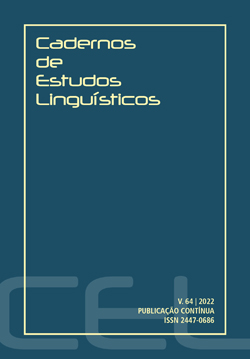Abstract
Scalar implicatures are traditionally defined as upper-bound interpretations of weak scalar terms, in which these terms assume the highest informative strength of their scales, denying more informative terms (e.g. "only some but not all") due to Grice's first submaxim of Quantity. I adhere to Noveck & Sperber (2007)'s hypothesis based on Relevance Theory, according to which the majority of cases considered scalar implicatures are just explicatures of conceptual narrowing (therefore, not implicatures nor scalar). However, in opposition to Noveck & Sperber (2007) I believe that not even implicated denials of stronger terms — which suitability to the context is under question — by weak terms should be considered scalar implicatures. I propose a model of derivation of such implicatures which is not supported by scalar relations established between concepts, but by the interlocutors' perception of compatibility between the concepts in comparison. I intend to demonstrate that processes of conceptual adjustment by explicature in conjunction with deductive rules of the modus ponens kind are sufficient for the extraction of implicatures of compatibility. Being so, the proposed model is able to explain a wider range of pragmatic phenomena than those classified as scalar implicatures resorting to principles that are common to the general interpretation of utterances and, in the case of deductive inferences, also to the interpretation of non-linguistic stimuli.
References
BOTT, Lewis; NOVECK, Ira. Some utterances are underinformative: The onset and time course of scalar inferences. Journal of Memory and Language, Vol. 51(3). 2004.
BREHENY, Richard, KATSOS, Napoleon; WILLIAMS, John. Are generalised scalar implicatures generated by default? An on-line investigation into the role of context in generating pragmatic inferences. Cognition, Vol. 100(3). 2005.
CARSTON, Robyn. Thoughts and Utterances: The Pragmatics of Explicit Communication. Oxford: Blackwell, 2002.
GAZDAR, Gerald. Pragmatics: Implicature, Presupposition and Logical Form. Academic Press, New York, 1979.
GAZES, Regina P.; HAMPTON, Robert. R.; LOURENCO, Stella F. Transitive inference of social dominance by human infants. Developmental Science, Vol. 20(2). 2015.
GRICE, Paul. Logic and Conversation. In COLE, Peter; MORGAN, Jerry (eds.), Syntax and Semantics, Vol. 3: Speech Acts, Academic Press, New York, p. 41-58, 1975.
HARTSHORNE, Joshua K.; SNEDEKER, Jesse; AZAR, Stephanie; KIM, Albert E. The Neural Computation of Scalar Implicature. Language, Cognition and Neuroscience, Vol. 30(5), p. 620 - 634. 2015.
HIRSCHBERG, Julia. A Theory of Scalar Implicature. Ph.D. dissertation, University of Pennsylvania. 1985.
HORN, Laurence. On the semantic properties of logical operators in English. Dissertation for Ph.D. in Linguistics. Los Angeles: UCLA. 1972.
KAMPA, Alyssa; ZINSZER, Benjamin; PAPAFRAGOU, Anna; JASINSKA, Kaja. Neural generation of scalar implicatures in preschool children and adults. Apresentado em 44th Boston University Conference on Language Development (BUCLD), Boston, EUA. 2019.
LEECH, Geoffrey. Principles of Pragmatics. London: Longman, 1983.
MATSUMOTO, Yo. The conversational condition on Horn scales. Linguistics and Philosophy 18, p. 21-60. 1995.
NOVECK, Ira. When children are more logical than adults: Experimental investigations of scalar implicature. Cognition, Vol. 78(2). 2001.
NOVECK, Ira; SPERBER, Dan. The why and how of experimental pragmatics: The case of 'scalar inferences'. In Advances in Pragmatics, ed. Noel Roberts. Palgrave, 2007.
PAPAFRAGOU, Anna; TANTALOU, Nikki. Children's computation of implicatures. Language Acquisition, Vol 12(1). p.71-82. 2004.
REITER, Ehud. The Computational Complexity of Avoiding Conversational Implicatures. Proceedings of the 27th Annual Conference of the Association of Computational Linguistics, 97-104. 1990.
RICHARDS, Cassandra A.; SANDERSON, Jennifer A. The role of imagination in facilitating deductive reasoning in 2-, 3- and 4-year olds. Cognition, Vol. 72(2), B1–B9. 1999.
SPERBER, Dan; WILSON, Deirdre. Relevance: Communication and Cognition. Second edition, Oxford: Blackwell, 1995.
WILSON, Deirdre. Relevance Theory and lexical pragmatics. UCL Working Papers in Linguistics 16, p. 343-360. 2004.
WILSON, Deirdre; SPERBER, Dan. Relevance Theory. In HORN, Laurence; WARD, Gregory (eds.) The Handbook of Pragmatics, Oxford: Blackwell, p. 607-632, 2004.

This work is licensed under a Creative Commons Attribution-NonCommercial 4.0 International License.
Copyright (c) 2022 Cadernos de Estudos Linguísticos


